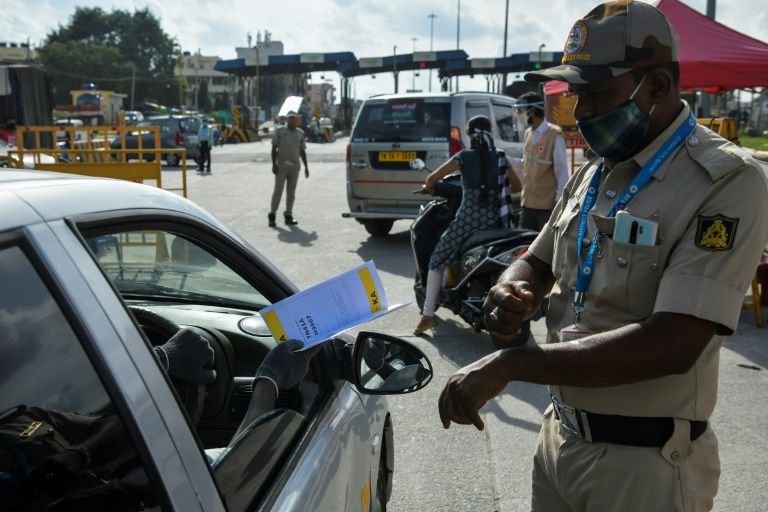India IT hub locks down as virus ravages UK, Singapore economies
Bangalore (India) (AFP) – India’s IT hub Bangalore was set to go into a new week-long lockdown on Tuesday as the number of coronavirus cases surged, while new economic figures from Singapore to Britain revealed the shocking extent of the damage wreaked by the global pandemic.
After imposing one of the world’s strictest lockdowns in late March, India had been steadily easing rules to lessen the huge economic impact.
But infections have continued to soar, passing 900,000 on Monday with almost 24,000 deaths, according to health ministry figures that many experts say underplay the severity of the situation.
Bangalore, home to more than 13 million people, has emerged as a new hotspot and a seven-day lockdown in the southern city is set to begin at 8:00 pm (1430 GMT).
Transport will be banned except for emergencies and only shops selling essential items allowed to open.
Firms in Bangalore’s lifeblood IT sector handling the back-office operations of global corporations can operate, but with only 50 percent of staff allowed on premises at any one time.
The western city of Pune has imposed a fresh lockdown after reporting a record 1,333 new infections on Monday and other states, including Uttar Pradesh, home to 200 million people, have also introduced new restrictions.
Many countries have been reimposing restrictions as new infections spread like wildfire.
– No return to ‘normal’-
“There will be no return to the ‘old normal’ for the foreseeable future,” said World Health Organization chief Tedros Adhanom Ghebreyesus, warning that without governments adopting a comprehensive strategy, the situation would get “worse and worse and worse”.
California drastically rolled back its reopening plans on Monday and ordered all indoor restaurants, bars and cinemas to close again as coronavirus cases soared across America’s richest and most populous state.
Churches — as well as gyms, shopping malls, hair salons and non-essential offices — must also shut indoor operations in half of the Golden State’s worst-hit and most densely populated counties, including Los Angeles.
“We’re moving back into a modification mode of our original ‘stay-at-home’ order,” said Governor Gavin Newsom, whose state was the first to close down in March, but began easing restrictions in May.
The move came as California reported 8,358 new daily coronavirus cases, bringing its total to nearly 330,000 including more than 7,000 deaths.
The bruising economic impact of the pandemic was starkly shown in Singapore, where the economy shrank more than 40 percent in the second quarter, plunging the Southeast Asian financial and trading hub into recession for the first time in a decade.
“It’s the worst-ever quarterly figure in Singapore’s 55-year history,” CIMB Private Banking regional economist Song Seng Wun told AFP on Tuesday.
– Alarm bells –
The worse-than-expected figures will ring alarm bells for other economies reliant on trade.
Britain also saw its economy shrink by nearly a fifth in the three months to May compared with the previous quarter as the lockdown crippled activity.
Across the globe, the pandemic has infected nearly 13 million people, killed more than 566,000 and triggered massive economic damage in the seven months since it was detected in the Chinese city of Wuhan.
Since the start of July, nearly 2.5 million new infections have been registered across the globe, with the number of cases doubling over the past six weeks, according to an AFP tally based on official figures.
Latin America on Monday recorded the world’s second-highest death toll, declaring a total of 144,758 deaths to pass the 144,023 recorded in the United States and Canada.
It now stands second only to Europe, where 202,505 people have died.
South Africa reimposed a nationwide curfew to prevent a “coronavirus storm” from ravaging the continent’s hardest-hit nation, where new infections have topped 12,000 a day.
Meanwhile, a French expert warned that a fully effective vaccine was highly unlikely by 2021.
And in what may prove a blow to those who have recovered, researchers at Kings College London said COVID-19 survivors could lose their immunity, leaving them vulnerable to reinfection within months.
burs-mtp/je
Disclaimer: Validity of the above story is for 7 Days from original date of publishing. Source: AFP.


